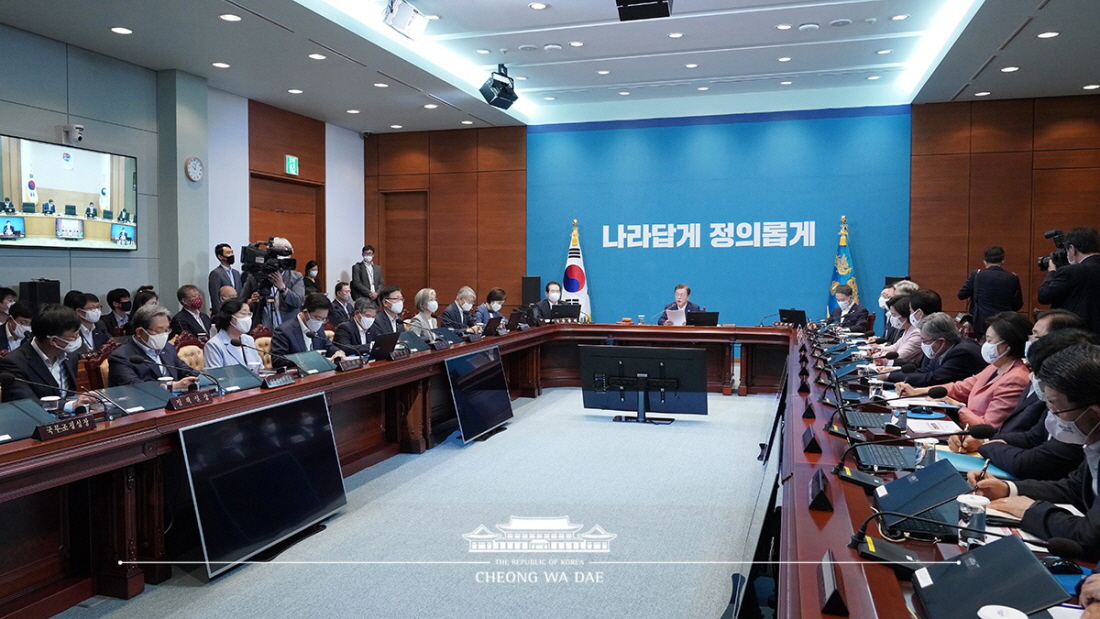이 웹사이트는 제19대 대통령 임기 종료에 따라 대통령기록관이 「대통령기록물 관리에 관한 법률」에 의해 이관받아 서비스하는 대통령기록물입니다. 자료의 열람만 가능하며 수정 · 추가 · 삭제는 불가능합니다.
다만, 「개인정보보호법」에 의하여 개인의 정보를 보호받기 원하시는 분은 관련 내용(요청자, 요청내용, 연락처, 글위치)을 대통령 웹기록물 담당자(044-211-2253)에게 요청해 주시면 신속히 검토하여 조치해 드리겠습니다. 감사합니다.
SPEECHES & REMARKS
BRIEFINGS
Opening Remarks by President Moon Jae-in at 32nd Cabinet Meeting and Meeting for Epidemic Prevention and Control Measures in Seoul Metropolitan Area

Let me begin the 32nd Cabinet Meeting and meeting for epidemic prevention and control measures in the Seoul metropolitan area.
Of note at today’s Cabinet Meeting, we are joined by the heads of three local governments – the mayors of Seoul and Incheon as well as the governor of Gyeonggi-do Province. We will begin the meeting by discussing infectious disease prevention and control measures in the Seoul metropolitan area.
It has been five months since the COVID-19 outbreak erupted in the country. Thanks to our people’s high civic awareness and sense of community, Korea is regarded as one of the world’s most exemplary countries in epidemic prevention and control. Now we are at a critical juncture where we have to further reduce daily new confirmed cases and bring about stability as soon as possible. The situation is all the more imperative as the spread of infections abroad is increasing once more and the development of treatments and a vaccine will take more time. It is no exaggeration to say that the stabilization of the COVID-19 outbreak now hinges on the Seoul metropolitan area. I urge the relevant local governments and infectious disease prevention and control authorities to work closely together.
If conquering the virus needs an extensive period of time, we should manage and cope with the situation in a composed manner – with the mindset of being in a long war – in order to prevent medical professionals and the people from becoming exhausted. Korea is faring better than any other country with its COVID-19 response. The principle of upholding transparency, openness and democracy that we adopted has now become a global model.
All of this has been made possible because our people have served as the principal actors in the infectious disease prevention and control efforts. Going forward, the Government will work with local governments and join the people in firmly defending the frontlines of epidemic prevention and control in a prolonged war against the virus.
I can assure you that our country’s COVID-19 situation still remains at controllable and manageable levels. What has been confirmed over the past five months is that – even while continuing our daily lives – we can prevent viral infections if we faithfully comply with government guidelines and fundamental rules for infectious disease prevention and control. We’ve grown tired now, and it’s getting even tougher due to the heat wave. Still, I hope people can find a little more strength until the situation stabilizes.
Local governments at the forefront of infectious disease prevention and control have played their roles well so far. They are preventing the spread of COVID-19 early on – responding preemptively by managing high-risk facilities and those under self-quarantine and securing hospital beds as well as swiftly dealing with new confirmed cases. In addition to assisting medical professionals, they are also doing their utmost to help overcome the economic crisis by supporting residents and small neighborhood businesses facing financial difficulties due to COVID-19.
Local governments’ creative thinking and swift on-site responses clearly show why decentralization matters. I urge related ministries and agencies to actively support local governments so that they do not face any difficulties with their epidemic prevention efforts on the ground. I also ask you to do everything possible to ensure that the recently rising inflow of the contagious disease from overseas does not lead to infections in local communities.
The National Assembly has yet to begin deliberating the supplementary budget proposal though the Government submitted it 20 days ago. It is a very unfortunate situation for both the people and businesses in need. The situation is urgent, indeed. The later the supplementary budget is passed, the greater the people’s suffering will become.
Timely support is pressing for many: people who’ve lost or are at risk of losing their jobs due to employment shock, small- and microbusiness owners and companies in danger of bankruptcy due to financial difficulties, and low-income households and the vulnerable whose hardships are even greater because of the economic crisis.
There may be setbacks to the plans to speed up economic recovery as well. Amid these already difficult economic circumstances, we won’t be able to swiftly implement measures to stimulate the economy, including those for boosting domestic demand, recovering exports, promoting investment and revitalizing local economies. With concerns growing over COVID-19’s second wave, we should not miss the opportunity to preemptively reinforce and strengthen the infectious disease prevention and control system.
The entire country is pulling together to ride out this national crisis. Medical professionals and those working on epidemic prevention and control are dedicating themselves – and the people are joining forces – to the fight against COVID-19. Households and businesses are all in life-or-death struggles to solve economic hardships. The Government is doing all it can to quickly surmount the national crisis and turn it into an opportunity.
The National Assembly’s cooperation is all that is needed now to substantially boost the efforts to overcome COVID-19 and the economic crisis. Anything pertaining to the Assembly’s operation is an issue that only the Assembly can decide. However, matters directly related to the lives of the people and their livelihoods must not be delayed for any reason. Passing the supplementary budget proposal is crucial and urgent for safeguarding people’s lives first and foremost. I earnestly urge the Assembly to pool its wisdom so as not to “lock the stable door after the horse has been stolen.”



